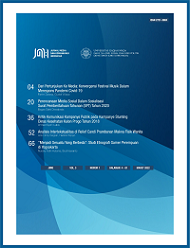“Menjadi Sesuatu Yang Berbeda”: Studi Gamer Perempuan Di Yogyakarta
Nurizky Adhi Hutama(1*), Budi Irawanto(2)
(1) Gadjah Mada University
(2) Departemen Ilmu Komunikasi, Fakultas Ilmu Sosial dan Politik, Universitas Gadjah Mada
(*) Corresponding Author
Abstract
Research on female gamers is still rarely found in studies of women. Considering that currently the activity of playing games can be enjoyed by anyone, it is not limited to men. Research on women in the gaming world is still rarely touched on due to the lack of researchers/researchers who have a fairly broad/established gaming perspective. This research was conducted because the world of games, especially e-sports, has a wide impact, especially in the entertainment, advertising, and technology industries. The results of what has been done in this research can be obtained that gamers are indirectly struggling to get recognition in the game world. They also strive to show more potential and can beat male gamers in general. Because the gaming world is patriarchal, female gamers feel disadvantaged by the lack of support for them both professionally (e-sports) and casually. Because some female gamers give male gaze satisfaction to male gamers in terms of entertainment, this has an unpleasant effect on other female gamers. As well as the lack of support from women who do not create certain games in terms of fraternity. Female gamers feel that their habits or hobbies are accepted from the community side, especially from fellow non-gamers/non-gamers. This research has several limitations, including the COVID-19 pandemic in mid- 2020. And it is hoped that this research will be able to contribute to research related to games and gamers. That there is still a lot that can be explored in this discussion considering that the game will never run over time.
Keywords
Full Text:
PDFReferences
Baudrillard, J. P. (2011). Masyarakat Konsumsi. Yogyakarta: Kreasi Wacana.
Butler, J. P. (1990). Gender Trouble (Feminism And The Subversion of Identity) New York: Routledge
Cassell, J., and Jenkins, H. (1998). From Barbie to Mortal Combat: Gender and Computer Games. Massachusetts, USA: MIT Press.
Creswell, John W. (2012). Research Design Pendekatan Kualitatif, Kuantitatif, dan Mixed. Yogyakarta: Pustaka Pelajar
Kim, H. (2009). Women’s Games in Japan: Gender Identity and Narrative Construction, Theory, Culture & Society, 25 (2-3), hal 165 - 188.
Morrisan. (2013). Teori Komunikasi : Komunikator, Pesan, Percakapan, dan Hubungan (Interpersonal). Bogor: Ghalia Indonesia.
Mulvey, L. (1989). Visual and Other Pleasure. New York: Palgrave
Rinta Arina M. (2021). Gamer Perempuan dan Permainan Kencan Virtual, Studi Psikoanalisis Lacanian atas Hasrat dan Fantasi Keintiman dalam “Mystic Messenger”. Tesis UGM Pascasarjana Jurusan Kajian Budaya dan Media. Yogyakarta. Universitas Gadjah Mada.
Article Metrics
Refbacks
- There are currently no refbacks.
Copyright (c) 2022 Jurnal Media dan Komunikasi Indonesia
| Jurnal Media dan Komunikasi Indonesia (Online ISSN 2721-396X) is published by the Department of Communication Science (DIKOM), Faculty of Social Science and Political Science (FISIPOL), Gadjah Mada University |












